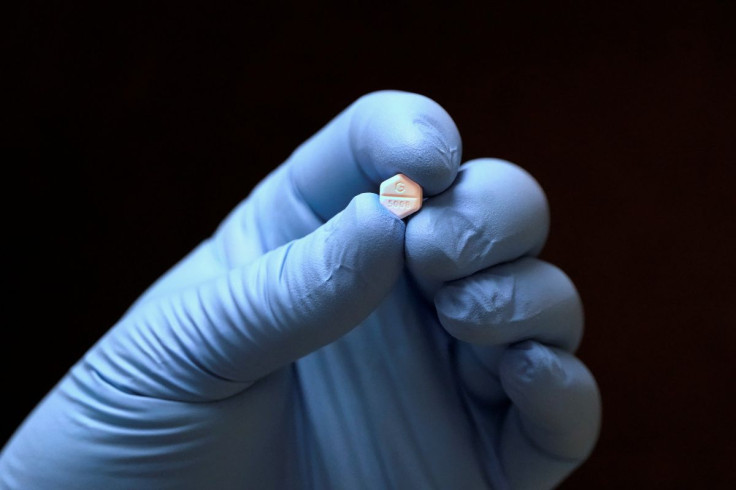Analysis-Abortion Pills Over The Counter? Experts See Big Hurdles In Widening U.S. Access

A pill used to terminate early pregnancies is unlikely to become available without a prescription for years, if ever, experts told Reuters, as the conservative-leaning U.S. Supreme Court dramatically curbed abortion rights this week.
The Supreme Court on Friday overturned the landmark 1973 Roe v. Wade ruling that recognized the constitutional right to an abortion and legalized it nationwide. The new ruling stung abortion rights advocates and was a momentous victory to Republicans and religious conservatives.
The pill, mifepristone, in combination with a second drug called misoprostol, induces an abortion up to 10 weeks into a pregnancy and is only available through a certified doctor's prescription. Abortion rights activists have stepped up calls to make it available at pharmacies without a prescription.
Many U.S. states intend to severely limit or outright ban abortions after the ruling. The White House is considering options to increase access to so-called medication abortions, which can be administered at home.
"Today I am directing the Department of Health and Human Services to take steps to ensure these critical medications are available to the fullest extent possible," President Joe Biden said at the White House on Friday.
"We will double down and use every lever we have to protect access to abortion care," Secretary of Health and Human Services Xavier Becerra said in a statement, adding the department would ensure access to "medication abortion that has been approved by the FDA for over 20 years."
Neither Biden nor Becerra addressed making the pills available over-the-counter, a process that could take years, medical and regulatory experts told Reuters. They said drugmakers would need to conduct studies showing directions on the product's packaging would enable a consumer to safely use it without professional medical guidance.
The two companies that make the pill for the U.S. market have shown no interest in the process. Should they do, any U.S. Food and Drug Administration approval would become a target for lawsuits from abortion opponents that could delay implementation for years, experts said.
"The hard part that I see is getting the evidence or the agreement that no prescriber is needed at all," said Susan Wood, a former Assistant Commissioner for Women's Health at the FDA.
"I personally don't see it happening in the next couple of years," said Wood, now director of George Washington University's Jacobs Institute of Women's Health.
THE NEXT BATTLE
Access to abortion pills is expected to become the next big battle, as their use is harder to track. The FDA has already relaxed some restrictions, making it easier for certified doctors to prescribe them.
It now allows certified doctors to prescribe mifepristone after a telehealth visit rather than in-person. Patients can receive it by mail, making it easier for women in states that restrict its use.
The White House has considered making abortion pills available online and from pharmacies abroad, with a prescription. However, the import possibility has been curtailed by Congress in broader legislation about drug regulation.
An over-the-counter designation would make it much easier to access pills in states restricting their use. For example, they could more easily be mailed from a friend or supporter in a state where they are not banned.
The FDA declined to comment on whether over-the-counter use of abortion pills has been considered. A spokesperson for Danco Laboratories, a manufacturer of mifepristone, said it does not plan to seek over-the-counter approval. GenBioPro, the second maker of mifepristone for the U.S. market, did not respond to requests for comment.
ARE THEY SAFE?
Medication abortion involves two drugs, taken over a day or two. The first, mifepristone, blocks the pregnancy-sustaining hormone progesterone. The second, misoprostol, induces uterine contractions.
When taken together, they halt the pregnancy and prompt cramping and bleeding to empty the uterus, a process similar to miscarriage.
Abortion rights activists say the pills have a long track record of being safe and effective, with no risk of overdose or addiction. In several countries, including India and Mexico, women can buy them without a prescription to induce abortion.
"Medication abortion really does meet all the FDA criteria for an over-the-counter switch," said Antonia Biggs, associate professor at the University of California, San Francisco's Obstetrics, Gynecology and Reproductive Sciences department.
Sue Liebel, state policy director for anti-abortion group Susan B. Anthony List, argued the FDA put women at risk by relaxing restrictions on mifepristone.
"Going over-the-counter would be the most egregious action we've ever seen the FDA do," she said. "If that does happen, we would certainly want to try to litigate that."
FDA records show an extremely small mortality case number: As of June 2021, there were reports of 26 deaths associated with mifepristone out of 4.9 million people estimated to have taken the pill since the product was approved in September 2000.
A study https://journals.lww.com/greenjournal/Fulltext/9900/Comprehension_of_an_Over_the_Counter_Drug_Facts.463.aspx by Biggs and colleagues found that the majority of participants would understand a medication abortion over-the-counter label. Biggs said she was not in talks with drugmakers over her research.
Others point to the decade-long legal fight for over-the-counter Plan B, a form of emergency contraception taken within days of sexual intercourse. The FDA approved its use for women 18 and over in 2006 and for all women in 2013.
"There was very strong support that you did not need a prescriber," said Wood, who resigned from the FDA in 2005 over the delay.
"Everybody under the sun agreed except for a small group of people who somehow had an enormous political influence."
© Copyright Thomson Reuters 2024. All rights reserved.







